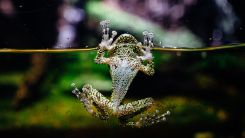
Ron Jefferson


Brad Pitt Believes He Has Face Blindness After Difficulty in Recognizing Faces; What Is This Condition?

Scientists Look for More Molecular Magnets for Improving Spin Electronics and Quantum-Scale Computing

Strange Death of Ancient Frogs in Prehistoric Swamp Solved, What Caused The Genocide?

New Ozone Layer Seven Times Bigger than the Antarctic Ozone

Neuronal Gene Expression That Causes Krabbe Disease Discovered for the First Time

Nausea and Hallucinations: Why Some Paris Tourists Feel Sick When Visiting?

Transition from Pap Smear to HPV Test for Better Cervical Cancer Prevention Slow in Ontario, Concerns Doctors

Magnet-Propelled Trucks: If Wile E. Coyote Could Do It, Why Can't We?

Zebrafish Breakthrough: Largest Genetic Atlas a Milestone for Biomedical Research

Novel Lithium-Ion Battery Resistant to Extreme Temperatures Allows Electric Cars to Travel Longer on Single Charge

Moon Heist: Is the Chinese Military Space Programme Eyeing to Takeover the Moon?

Dentist Concerned Over Alarming Popularity of 'Turkey Teeth' Trend, What Is It?

New Species of Great Water Lily Discovered, Hid in Plain Sight for More Than 170 Years

Glacier in Italian Alps' Marmolada Melts, Caused Avalanche That Took 6 Hikers

Mysterious Bright Sphere Captured Bouncing Across Welsh Skies, UAP Shaped as Audi R8

Largest Collection of Prostate Cancer Biopsy Images Learned by AI Algorithm to Assist Urologists on Early Diagnosis

Alarming Outbreak of Skin Tumor Among Antarctic Fish Linked to Climate Change

AI Software Helps to Discover New Genome Family in Gut Microbiomes Through Protein in Seafood-Poisoning Bacteria

Ghostly Apparitions on Night Sky Shines Brightest This Week after 15 Years of Observation, What Are These Objects?

China's Tianwen-1 Captures Entire Image of Red Planet from Orbit, Completes Mars Mission with Zhurong Rover

How Does ‘Zombie Cells’ Form? New Molecular Process Shows It For the First Time

Orchid Species Thought Extinct For More Than a Century Rediscovered in Vermont

External Electrical Stimulation Restores Upper Limb Control of Paralyzed Monkeys

New Anti-Crime AI Algorithm Predicts Activities One Week Ahead With 90% Accuracy, Reveals Bias in Police Work

Never-Before-Seen Carnivorous Plant Hides Underground and Traps Prey

Novavax COVID-19 Vaccine Effective Against All Mutations Including Omicron

Bizzare Anthropomorphic Cave Art With Gigantic Heads Stuns Archaeologists in Tanzania

Solar System Still Stable for Another 100,000 Years, New Calculations Says

Bolstering Plant Immunity Vs Climate Change Could Help Plants Fight Back Diseases
Most Popular

Persistent Coughs Are Everywhere: Here's What Experts Think Is Causing It

Ancient Hotspot Found to Have Created Great Lakes 300 Million Years Ago

Mysterious Structures Discovered Beneath the Pacific Ocean, Puzzle Scientists

Health Benefits of Drinking Hot Chocolate




